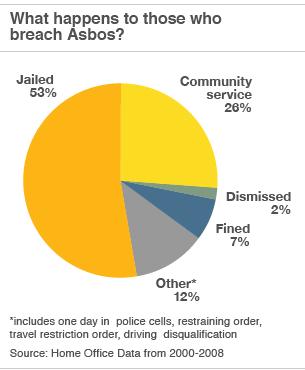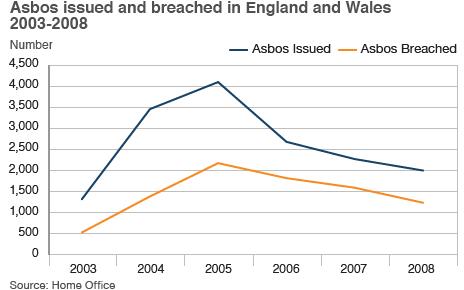Q&A: Anti-social behaviour orders
- Published
The government has said it could get rid of Asbos in England and Wales, a key part of Labour's drive against anti-social behaviour.
What are anti-social behaviour orders?
Anti-social behaviour orders - or Asbos - are civil (rather than criminal) orders imposed on individuals by the courts.
They are aimed at banning the individual from engaging in specific kinds of behaviour or going to certain places.
These can prohibit actions which, although not criminal themselves, would be necessary steps before a criminal act - such as a ban on entering a shop rather than on shoplifting.
Breaching an Asbo can result in a criminal punishment of up to five years in prison.
How are they imposed?
Brought into force by the Labour government in 1999, Asbos are imposed by magistrates after an application by a case officer, who usually works for the local council.
The officer has to tell the court details such as the people and incidents involved and the restrictions of the proposed Asbo.
Magistrates also hear about welfare issues, family circumstances, attempts at mediation and warnings and evidence that the defendant has not been victimised or discriminated against.
It then decides what prohibitions to apply.
How long do Asbos last?
They have to apply for at least two years and can be indefinite. Asbos must be "reasonable and proportionate and realistically practical".
Appeals against them can be made to a Crown Court.

What happens when Asbos are breached?
This is a criminal offence, for which a defendant can be arrested.
The police investigate and can obtain information from any source including housing and other local authority officers, neighbours and members of the public.
Occasionally, for offenders younger than 18-years-old where the breach is not considered "flagrant", a final warning with an intervention programme may be imposed.
But usually breach of an Asbo will result in prosecution and a court appearance, leading to up to five years in jail.
What is the current government doing?
Conservative Home Secretary Theresa May has ordered a review of Asbos in England and Wales, suggesting they could be axed.
Mrs May argues that they do nothing to rehabilitate offenders and criminalise many young people.
With more than half of Asbos breached between 2000 and 2008, she says they are not working and that police should be given more freedom to deal with disorder.
It is up to ministers in Scotland and Northern Ireland to make changes, if any, to Asbos there, under the rules of devolution.
Are there other criticisms?
There are complaints that Asbos infringe defendants' human rights, especially when they are "named and shamed" in the media or through leaflets and posters.
Others say Asbos have no teeth and defendants would be better dealt with by a period in prison or a Young Offender Institution.
What does Labour say?
The party, which brought in Asbos while it was in power, says they have made a huge difference in cutting crime and disorder and accuses Mrs May of going soft on crime.

- Published28 July 2010